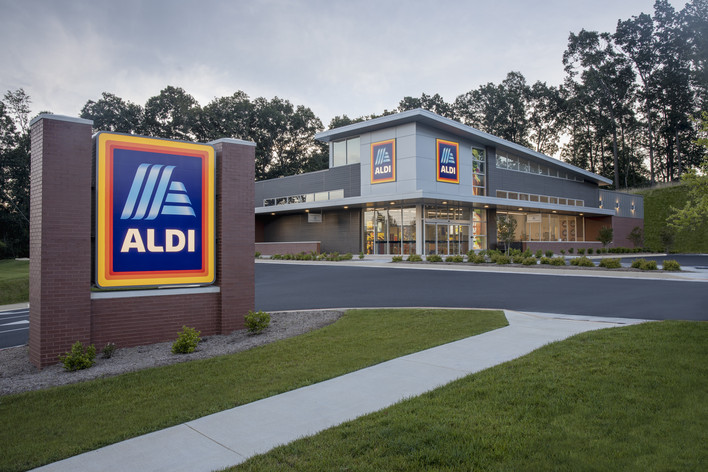When you toss assumptions out the window, you can break rules to win.
That’s how a little-known German grocery company ripped through competitors on a track to secure the spot for the third-largest supermarket chain in the United States, behind Walmart and Kroger.
- Smaller building space
Aldi stores are about 12,000-17,000 square feet compared to big-box stores like Walmart, which clock in near 178,000 square feet.
That calculates to paying less in rent, utilities, and employees to stock those 150,000 additional square feet.
So fewer employees can stock the entire store. And they’re cross-trained, so any of them can do what’s needed–stocking shelves, checking out customers, etc. Most stores only have three or four working at a time. That means Aldi can pay workers more per hour than many of its competitors.
Aldi buildings usually have four or five aisles, meaning there’s not an entire aisle of cereal.
So customers buy more of the same exact items, allowing the store to order in bulk, which saves money.
Over 90 percent of the products are exclusive items instead of name brands.
- No frills
You have to “rent” a cart for a quarter that you get when you return the cart.
That’s so the store doesn’t have to pay employees to complete frustrating and never-ending tasks of chasing carts, and shoppers don’t need to worry about those carts hitting vehicles or taking up parking spaces.
Products aren’t neatly lined on the shelves–that would take time away from workers who are checking out customers, and that isn’t on-brand for ALDI.
Instead, employees place boxes of items on the shelf. That means less time stocking aisles, and more time helping customers.
The store doesn’t publicly list a phone number, have decorations, or free bags. It focuses on what it does best; sling crazy, low-priced food, not include bank or optician services.
Customers are encouraged to bring reusable bags or grab empty boxes across the store, personifying the scrappy nature of ALDI.
When customers check out they’re pushed to bag groceries at the front of the store. That frees up employees to staff another checkout line or stock shelves.
- Restricted store hours
Before the coronavirus, many grocery stores such as Walmart and Meijers were open 24 hours a day.
But not ALDI. It limits store hours to rush hours each day so workers don’t have to clock in time serving sparse customers and reaping restricted revenue.
Why this matters
Two brothers officially founded ALDI in 1946, a year after the close of World War II.
Necessity is the mother of invention. Even in dark times, the brothers ruthlessly slashed preconceived grocer rules to create a company that would soon overtake foreign markets.
Today is no different. Earth-shattering companies are created when there’s no other option.
Travis Kalanick and Garrett Camp founded Uber in 2009 because they were sick of unreliable taxis.
Slack was created in 2009 to manage a gaming company. Now 65 of the Fortune 100 use the app, along with companies across the world that are forced to work remotely.
More than 6.6 million Americans are out of work due to government-mandated business closures in reaction to the coronavirus.
But that doesn’t mean ideas have to die. Go change the market. Hard times force focus on what matters.
